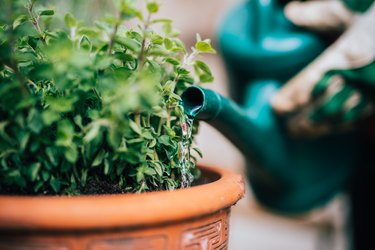
Water temperature affects plants in many ways. A change of temperature alters metabolic activity and even affects aquatic ecosystems. From houseplants to aquatic plants, water temperature plays a part in growth and development.
Growth and Development
Video of the Day
Water temperature affects the metabolic activity of plants, slowing activity under cool conditions. In a 2007 report in "The Southwestern Naturalist," authors Lori R. Tolley-Jordan and her co-authors found that wild rice plants grown in cool water exhibited fewer and shorter leaves than plants grown in warmer water. The cool-water plants also lost the ability to produce reproductive structures.
Video of the Day
Aquatic Plants
Water temperature has a direct effect on the growth of aquatic plants. An unnatural introduction of warm water into a water body is called thermal pollution. Examples of this kind of pollution include runoff from heated roadways and warm water released from industrial facilities into waterways. Thermal pollution alters the population dynamics of aquatic plants, allowing some species in previously small numbers to flourish at warmer temperatures. Also, some aquatic plants float to the surface in warm water.
Houseplants
Many houseplants are indigenous to tropical regions. Providing cold water to your indoor plants seems refreshing, but it likely stresses these tropical natives. According to Clemson University, splashing cold water on leaves and flower buds could result in white spots on foliage and bud drop. Before watering, allow cold water to warm to room temperature; also, water additives that are harmful to plants will settle in warmer water.
Seeds and Vegetative Cuttings
The plant nursery and seed industry routinely uses hot water on vegetative cuttings and seeds to kill pathogens and insect pests. Dipping seeds of vegetables like eggplant, tomato, carrot, celery into hot water kills bacteria. However, other kinds of seeds are vulnerable to hot water. Ohio State University says that hot water injures cucurbit seeds, such as squash and pumpkin. In a 2005 article in the "Journal of Economic Entomology," scientists reported that immersing grape cuttings in hot water is effective in controlling the mealybug pest.